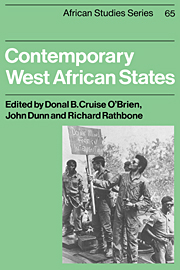1 - Introduction
Published online by Cambridge University Press: 10 December 2009
Summary
The imperfections and limitations of West African states have been much remarked by outside observers over the period of close on three decades since independence, while another topic, that of the very survival of the state, has slowly emerged. It should of course be admitted that the critical comments of journalists or academics on the subjects of official corruption, poor governmental performance, the prevalence of unregulated social conflict or institutional decay are in broad terms often justified. But such critical commentary is properly to be set against the important fact that these states without exception have maintained themselves in being. The states of West Africa have, for example, escaped the more drastic forms of political disintegration apparent in Uganda or Sudan, in Zaire or in Mozambique.
In the process of surviving, the West African states may have more or less subtly altered in character as their rulers and citizens have modified their political expectations, discarding the innocent hopes of the early years of independence, but the state as political unit appears to rest on a significant measure of popular acceptance. The state has in general scarcely been challenged with any resolution, in principle a surprising fact in the case of such an allegedly artificial political entity, the creation of European colonial rule. The case of Biafra remains the outstanding exception in this regard, for outside of Nigeria it is the absence of concerted challenge to the state which is remarkable.
- Type
- Chapter
- Information
- Contemporary West African States , pp. 1 - 12Publisher: Cambridge University PressPrint publication year: 1990

